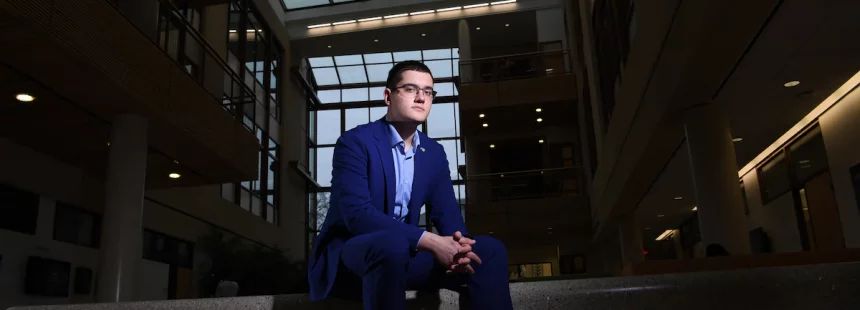

Thank you Daniel and everyone for making this incredible program a reality. As the article mentions, Ukrainians also have much to teach their peers in the “old” democratic world about the value of democracy and fighting for it. https://t.co/O7BkC1ko6R https://t.co/tXc5u4ENof
— Garry Kasparov (@Kasparov63) December 16, 2022
This article is a reprint. You can read the original at the Washington Post.
By Susan Svrluga
“When Andrii Umanskyi left in the summer of 2021 to study at American University, his hometown of Skadovsk, Ukraine, was a prosperous seaside resort town. Then Russia invaded. Now Skadovsk and the surrounding area are under Russian occupation, with conditions steadily worsening. Staying in contact with his family has grown increasingly difficult for Umanskyi.
His father was nearly detained and imprisoned, Umanskyi said. His 16-year-old brother has been resisting orders to attend the school overtaken by Russians, trying to continue his Ukrainian education.
And Umanskyi, at 19, feels enormous weight on his own future.
“I feel more responsibility on me now,” he said. “It became apparent that awareness has to be spread.”
Umanskyi is one of 20 Ukrainian students chosen for a year-long scholarship created by chef and humanitarian José Andrés, human rights and pro-democracy activist Garry Kasparov, KIND Snacks founder Daniel Lubetzky and retired Army Lt. Col. Alexander Vindman.
The scholarship’s founders have two goals, Lubetzky said. The first is to support Ukraine during the war. “Ukraine is in the vanguard of the fight for democracy globally, and it is our responsibility as people that cherish democracy and freedom of expression and rule of law to try to support those being attacked by totalitarianism,” said Lubetzky, a social entrepreneur.
But they also want to remind Americans not to take democracy for granted. Each of them was born abroad and deeply appreciates the freedoms that Americans have, Lubetzky said. “We know that it doesn’t exist everywhere.” They say the Ukrainian students can be great ambassadors, not just for their home country, but for the urgency of protecting democracy.
“I think this is actually historic,” said Allan E. Goodman, chief executive of the Institute of International Education, which helped with the application process for the scholars, “because this is the first time that I know of, that in the midst of a crisis like Ukraine … education was part of the immediate emergency response.”
People respond to such crises by providing food — as Andrés has done for Ukraine and elsewhere with his World Central Kitchen — water, blankets, sanitation and efforts to provide basic safety, Goodman said. But with an estimated 1.5 million Ukrainian college students displaced from educational opportunities, — because they are now serving in the military, their schools have been destroyed or for other reasons — the risk is of a lost generation, he said.
Aid can solve their immediate problems such as hunger, but education will be essential for solving future problems, he said.
Ukraine has a strong university system, Goodman said, and the Institute of International Education has been working there for many years and was able to help with the scholarship because of their familiarity with the region.
There are about 1,900 students from Ukraine in the United States now, Goodman said, but he expects hundreds more will be seeking an education abroad if the war does not end soon. He predicted the total here could double in the next year.
Lubetzky’s formative appreciation for American democracy came from his father, who was forced into the Dachau concentration camp. “The fact that Germany democratically elected Hitler terrifies me,” he said, and reminds him how fragile American freedoms are.
In the United States recently, he said, he sees “the trends of rigidity and polarization and the tribalism that’s overtaking our country,” making it important to build common ground among Americans, an appreciation for shared values and shared responsibility to defend those principles.
Ostap Stefak, 22, a junior at Harvard University from Lviv, Ukraine, said many of his classmates don’t realize how important those values are to so much of the world. “Ukrainians now are going through the same fight, the same battle for democracy,” that Americans fought more than 200 years ago, he said. “American democracy is still such an ideal for so many people around the world.”
When he finishes his studies in applied mathematics with economics and computer science, Stefak wants to help Ukraine. “I want to make sure that markets are free and transparent, that peoples’ economic rights are protected,” he said. “Things like property rights, these are very fundamental things — without them it’s very difficult to have economic growth.”
Umanskyi, who is studying foreign relations and started his degree virtually in 2020, has been having more and more trouble making sure his family is safe. Sometimes, there is a good enough connection to talk with them, but mostly they message one another through the Telegram app. It’s hard to concentrate on his studies knowing his family is in so much danger at home, but he tries to focus his thoughts on finding solutions.
While it was difficult to leave for the United States, Umanskyi said he determined it was the most rational course, so he could bring back expertise to help rebuild and strengthen his country. “For me, as a Ukrainian scholar, to promote democracy in Ukraine,” he said, “I think I made the right choice.””

